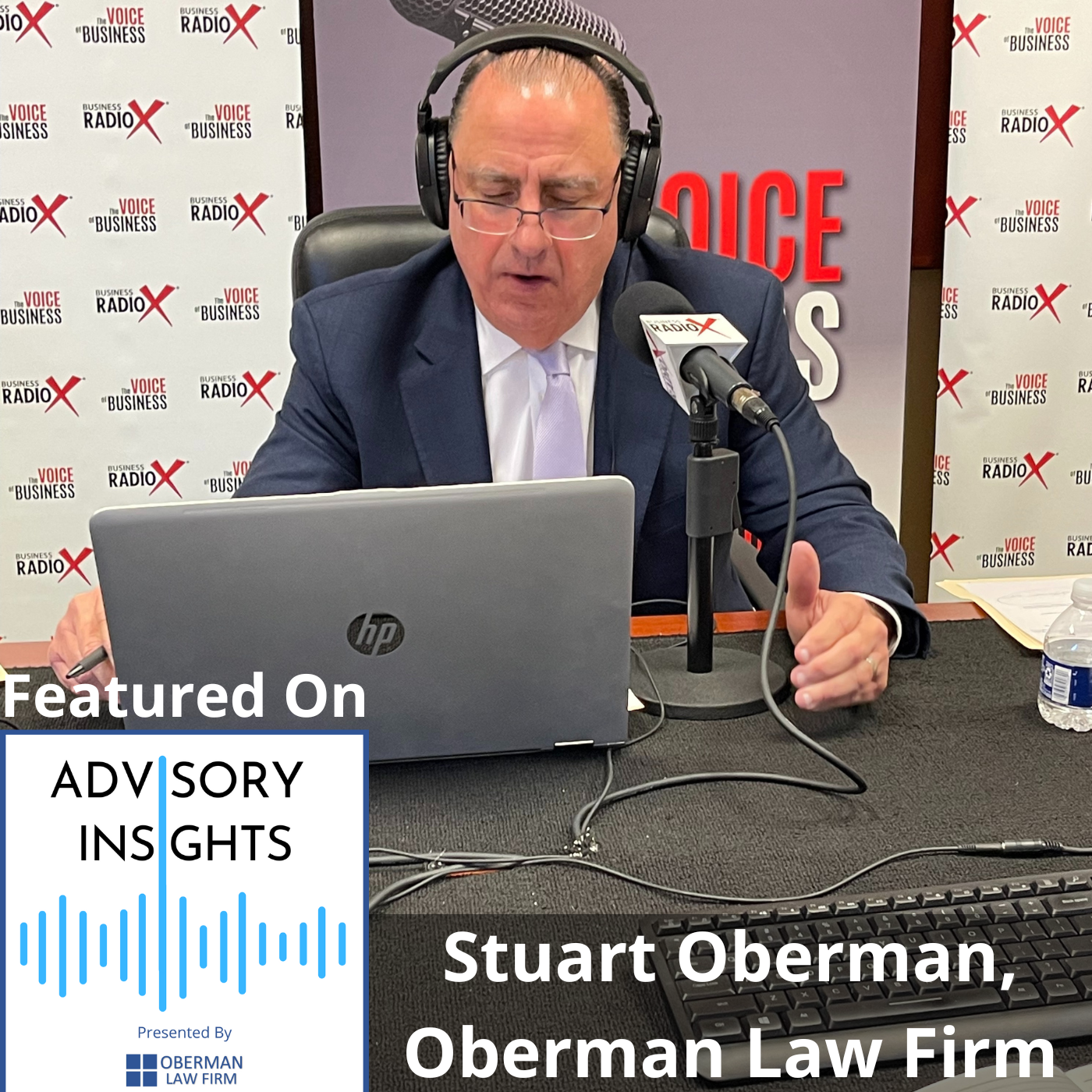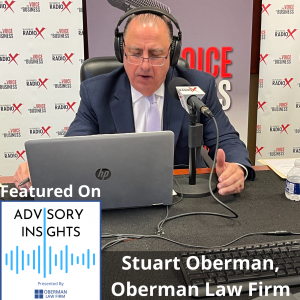
Material Risks in a Healthcare Merger (Advisory Insights Podcast, Episode 16)
On this episode of Advisory Insights, Stuart Oberman of Oberman Law offered due diligence tips when purchasing a healthcare practice. He discussed the material risks and potential pitfalls of buying a healthcare business without fully understanding the requirements of governmental reimbursement, the importance of being knowledgeable about laws like the Anti-Kickback Statute, the Stark Law, the False Claims Act, and more.
Advisory Insights is presented by Oberman Law Firm and produced by the North Fulton studio of Business RadioX®. The series can be found on all the major podcast apps. You can find the complete show archive here.
TRANSCRIPT
Intro: [00:00:01] Broadcasting from the studios of Business RadioX, it’s time for Advisory Insights, brought to you by Oberman Law Firm, serving clients nationwide with tailored service and exceptional results. Now, here’s your host.
Stuart Oberman: [00:00:21] Welcome everyone to Advisory Insights. This is Stuart Oberman as your host. I would say I want to talk about mergers and acquisitions in health care. I will tell you, last year was an absolute blistering year in the industry. And I’ll tell you, for us, Oberman Law Firm, it was amazing last year what we did, how we did it, especially in the fourth quarter.
Stuart Oberman: [00:00:45] So, a substantial part of what we did on the mergers and acquisitions was health care related. But I want to talk about some items in general. A little background. Last year we did I think the numbers were about 135 transactions, I think maybe a little bit plus or minus. And I believe the number was a total of about $350 million worth of transactions. So, we saw a lot, a lot of things in healthcare transactions. I want to talk about a couple of things in particular.
Stuart Oberman: [00:01:17] So, first and foremost, for those that are in a highly regulated industry, especially in health care, you’ve got to be careful when you do diligence. So when you are doing a healthcare transaction, an acquisition, it should never be overlooked that what you’re doing is and has to be heavily regulated. So, one of the things that we look for is we want our buyers to sift through sellers’ records to ensure that that seller is in compliance with state and federal law, especially on the reps and warranties. That’s a whole other topic we may cover for another day.
Stuart Oberman: [00:02:07] But if you are in a healthcare-related transaction and you are the buyer, I cannot stress enough on your due diligence, do not, do not leave off compliance. So, especially – I want to talk especially about this area. If you are buying a business, whether it is a medical practice, whether it is a particular practice area in different industries, you have to be extremely careful if that buyer, or if that seller, participates in the Federal Health Care Programs. Acronym FHCP. That has to be scrutinized in every single healthcare transaction.
Stuart Oberman: [00:02:59] So, let me tell you if it is an FHCP practice or business and they get government reimbursement, there are extremely stringent provisions for participation in that particular payment structure, if you will, in how they submit claims. You have to audit how they submit claims because that is a material risk, a due that you will inherit if it is not done correctly. Once you purchase that business, you run the risk of being a successor to liability.
Stuart Oberman: [00:03:42] So, what happens is if they don’t, if the seller has not met stringent – I can’t stress this enough – stringent requirements, they are facing substantial civil fines and penalties. And also you cannot overlook the potential of clawbacks, allegations of overpayment, and in some cases, False Claims Act, FCA, liability. That is critical that you have to understand the requirements of governmental reimbursement and how they relate to any industry – I mean, excuse me, how they relate to any business in health care.
Stuart Oberman: [00:04:24] Now, what I’ll tell you is we’re seeing this a huge clampdown – the DOJ, strikeforce, regions throughout the country – fraud and abuse. Fraud and abuse under the FHCPs is rampant. Absolutely rampant. If you look at the advisory notices, the takedowns under the DOJ communications, you’re going to look at a couple of things. You’ve got to look at the Anti-Kickback Statute, AKS. If you don’t know what that is and you’re buying a business that is subsidized by governmental reimbursement, you have to get assistance with that transaction. Stark law, Physicians Self-Referral prohibition. You have to look under the criminal and civil False Claims Act.
Stuart Oberman: [00:05:20] Those under fraud and abuse will take you down financially quickly if you purchase a particular healthcare business and you’re not fully aware of this. One thing that we see a lot that is overlooked is licensures. So, depending on what business you are purchasing, every healthcare business requires certain licensure, no matter what it is. In some cases, they’re very specific. They could be generic. You have to do your due diligence under the licensure requirements in healthcare transactions because if you purchase a business and then you overlook the proper licenses, you are looking at potential disaster on a very, very expensive investment.
Stuart Oberman: [00:06:09] So, those are a couple of things. Again, I can probably speak for three hours regarding governmental reimbursement, FHCP programs, fraud and abuse. The Anti-Kickback Statute is a three-hour lecture in and of itself. Stark is a whole different world. That’s another – you know, you could easily talk an hour or 2 hours in Stark and not even hit half the topics. But I would strongly encourage you to know exactly what the False Claims Acts are and how they relate to you in the transaction.
Stuart Oberman: [00:06:42] So, folks, that’s a very, very short summary of a very complex matter. If you have a healthcare transaction, it does not have to be a large hospital. It could be a dermatology practice, dental practice, healthcare practice. It doesn’t matter. Anything that is regulated by the government in health care, especially if they take Federal Health Care Program subsidies, reimbursements, critical, folks.
Stuart Oberman: [00:07:13] Folks, that’s a very, very short topic for a long, long conversation.
Stuart Oberman: [00:07:17] I want to welcome – and thank you for joining Advisory Insights. Stuart Oberman here. Please feel free to give us a call at 770-554 – excuse me, 770-886-2400. Again, 770-886-2400. Or feel free to reach out, email, stuart, S-T-U-A-R-T, @obermanlaw.com. Folk, thanks for joining us again. We appreciate you joining us and have a fantastic day.
Outro: [00:07:45] Thank you for joining us on Advisory Insights. This show is brought to you by Oberman Law Firm, a business-centric law firm representing local, regional, and national clients in a wide range of practice areas, including healthcare mergers and acquisitions, corporate transactions, and regulatory compliance.
About Advisory Insights Podcast
Presented by Oberman Law Firm, Advisory Insights Podcast covers legal, business, HR, and other topics of vital concern to healthcare practices and other business owners. This show series can be found here as well as on all the major podcast apps.
Stuart Oberman, Oberman Law Firm

Stuart Oberman is the founder and President of Oberman Law Firm. Mr. Oberman graduated from Urbana University and received his law degree from John Marshall Law School. Mr. Oberman has been practicing law for over 25 years, and before going into private practice, Mr. Oberman was in-house counsel for a Fortune 500 Company. Mr. Oberman is widely regarded as the go-to attorney in the area of Dental Law, which includes DSO formation, corporate business structures, mergers and acquisitions, regulatory compliance, advertising regulations, HIPAA, Compliance, and employment law regulations that affect dental practices.
In addition, Mr. Oberman’s expertise in the healthcare industry includes advising clients in the complex regulatory landscape as it relates to telehealth and telemedicine, including compliance of corporate structures, third-party reimbursement, contract negotiations, technology, health care fraud, and abuse law (Anti-Kickback Statute and the State Law), professional liability risk management, federal and state regulations.
As the long-term care industry evolves, Mr. Oberman has the knowledge and experience to guide clients in the long-term care sector with respect to corporate and regulatory matters, assisted living facilities, continuing care retirement communities (CCRCs). In addition, Mr. Oberman’s practice also focuses on health care facility acquisitions and other changes of ownership, as well as related licensure and Medicare/Medicaid certification matters, CCRC registrations, long-term care/skilled nursing facility management, operating agreements, assisted living licensure matters, and health care joint ventures.
In addition to his expertise in the health care industry, Mr. Oberman has a nationwide practice that focuses on all facets of contractual disputes, including corporate governance, fiduciary duty, trade secrets, unfair competition, covenants not to compete, trademark and copyright infringement, fraud, and deceptive trade practices, and other business-related matters. Mr. Oberman also represents clients throughout the United States in a wide range of practice areas, including mergers & acquisitions, partnership agreements, commercial real estate, entity formation, employment law, commercial leasing, intellectual property, and HIPAA/OSHA compliance.
Mr. Oberman is a national lecturer and has published articles in the U.S. and Canada.
Oberman Law Firm
Oberman Law Firm has a long history of civic service, noted national, regional, and local clients, and stands among the Southeast’s eminent and fast-growing full-service law firms. Oberman Law Firm’s areas of practice include Business Planning, Commercial & Technology Transactions, Corporate, Employment & Labor, Estate Planning, Health Care, Intellectual Property, Litigation, Privacy & Data Security, and Real Estate.
By meeting their client’s goals and becoming a trusted partner and advocate for our clients, their attorneys are recognized as legal go-getters who provide value-added service. Their attorneys understand that in a rapidly changing legal market, clients have new expectations, constantly evolving choices, and operate in an environment of heightened reputational and commercial risk.
Oberman Law Firm’s strength is its ability to solve complex legal problems by collaborating across borders and practice areas.
Connect with Oberman Law Firm:
Company website | LinkedIn | Twitter
















